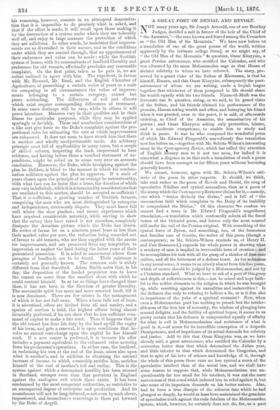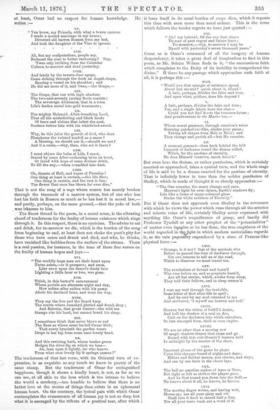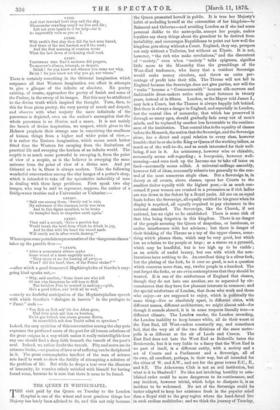A GREAT POET OF DENIAL AND REVOLT.
NOT many years ago, Sir Joseph Arnould, one of our Bombay Judges, decided a suit in favour of the heir of the Chief of " the Assassins,"—the man known and feared among the Crusaders as "the Old Man of the Mountain." We have now before us a translation of one of the great poems of the world, written apparently by the intimate college Mewl, as we might say, of " the Old Man of the Mountain " in question, Omar Khayyam, a great Persian astronomer, who rectified the Calendar, and who was educated by the same Mohammedan sage as that Hasan of sinister celebrity to whom we have referred. The story, pre- served by a grand vizier of the Sultan of Khorassan, is that he himself, Hassan, and this Omar Khayyam, subsequently the poet- astronomer of whom we are writing, made a boyish league together that whichever of them prospered in life should share his wealth equally with his two friends. Nizam-ul-Mulk was the fortunate one in question, rising, as we said, to be grand vizier of the Sultan, and his friends claimed his performance of the promise, Hassan asking wealth and office, and betraying his friend when it was granted, even to the point, it is said, of afterwards ordering, as Chief of the Assassins, the assassination of his patron ; and Omar Khayyam asking only protection, leisure, and a moderate competence, to enable him to study and think in peace. It was he who composed the wonderful poem of which Mr. Edward Fitzgerald's marvellously fine translation now lies before us,—together with Mr. Schatz-Wilson's interesting essay in the Contemporary Review, which has called the attention of English literary men to it not too soon, for indeed it is somewhat a disgrace to us that such a translation of such a poem should have been amongst us for fifteen years without becoming generally known.
We cannot, however, agree with Mr. Schatz-Wilson's esti- mate of the poem in other respects. It should-, we think, take rank rather as the poem of Revolt and Denial, the song of speculative Nihilism and cynical sensualism, than as a poem of the stamp which the Contemporary Reviewer claims for it,—namely, one which "denies divinely the divine," and is full of "the unconscious faith which complains to the Deity of its inability to comprehend the Divine." Of this character 'we confess we cannot find a trace in Mr. Edward Fitzgerald's magnificent translation,—a translation which confessedly selects all the finest verses of the Oriental poem, and leaves only the most sensual still under the veil of the Persian original. With something of the cynical force of Byron, and something, too, of the humorous and familiar ease of Goethe, the writer of this poem (though a contemporary, as Mr. Schutz-Wilson reminds us, of Henry H. and Fair Rosamond,) expends his whole power in showing what a mockery of man is implied in irreversible laws of creation ; and he accomplishes his task with all the grasp of a thinker of first-rate calibre, and all the bitterness of a defiant heart. As for nobleness in any moral sense, it seems to us utterly absent from this fine poem, which of course should be judged by a Mohammedan, and not by a Christian standard. What we have to ask of a poet of this grasp and depth of reflectiveness is this,—has he seized and kept faith- ful to the nobler elements in the religion in which he was brought up, while revolting against its unrealities and insincerities? Is the defiance due only to refusing to believe a lie, or is it due also to impatience of the yoke of a spiritual restraint? Now, when even a Mohammedan poet has nothing to preach but the intoler- ableness of the iron law of necessity, the wisdom of plunging into sensual delights, and the futility of spiritual hopes, it seems to us pretty certain that his defiance is compounded equally of affinity for what is evil in Mohammedanism and resistance of what is good in it,—of scorn for its incredible conception of a despotic Omnipotence, and of impatience of its actual demands for sobriety and justice. Add to this that Omar Khayyam was, as we have already said, a great astronomer, who rectified the Calendar by a correction better than that which determined the Julian year, and little inferior to that which determined the Gregorian, and that in spite of his love of science and knowledge of it, through the whole of this poem there runs no less cynical a scorn of the speculative intellect than of the moral law, and we shall have some reason to suppose that, while Mohammedanism was un- questionably far too small for his intellect, it was not the mere narrowness of that creed which induced him to rebel against it, but also some of its imperious demands on his better nature. Also, had he been a true disciple of the sciences into which he had plunged so deeply, he would at least have maintained the grandeur of speculative truth against the rude fatalism of the Mohammedan system, which, however, he certainly does not do, for, as a poet at least, Omar had no respect for human knowledge. He writes :—
LV.
"Yon know, my Friends, with what a brave carouse I made a second marriage in my house ; Divorced old barren Reason from my bed, And took the daughter of the Vine to sponse.
Ah, but my computations, people say, Reduced the year to better reckoning? Nay, 'Twas only striking from the Calendar Unborn to-morrow and dead yesterday.
And lately by the tavern-door agape, Came shining through the dusk an Angel-shape, Bearing a vessel on his shoulder; and He bid me taste of it, and 'twas,—the Grape,—
The Grape, that can with logic absolute The two-and-seventy jarring Sects confute; The sovereign Alchemist, that in a time Life's leaden metal into gold transmute ;
The mighty Mahmed, Allah-breathing Lord, That all the misbelieving and black horde Of fears and visions that infest the soul, Scatters before him with his whirlwind-sword.
Lx.r.
Why, be this juice the growth of God, who dare Blaspheme the twisted tendril as a snare ?
A blessing, we should use it,—should- we not ? And if a curse,—why, then, who set it there ?
WEIL
I must abjure the balm of Life, I must, Scared by some After-reckoning ta'en on trast, Or lured with hope of some diviner drink, To fill the cup,—when crumbled into dust.
LXIIL
Oh, threats of Hell, and hopes of Paradise ! One thing at least is certain,—this life flies; One thing is certain, and the rest is lies: The flower that once has blown for ever dies."
That is not the song of a sage whose reason has merely broken through the trammels of a narrow system, but of one who has lost his faith in Reason as much as he has lost it in moral law,—
and partly, perhaps, on the same ground,—that the yoke of both was irksome to him.
- The finest thread in the poem, in a moral sense, is the vibrating chord of tenderness for the frailty of human existence which rings through it. In this respect, there is no cynicism. The advice to eat and drink, for to-morrow we die, which is the burden of the song from beginning to end, at least does not choke the poet's pity for those who have eaten and drunk and died, and who, he thinks,
have vanished like bubbles from the surface of the stream. There is a real passion, for instance, in the tone of these fine verses on the frailty of human hopes and joys :—
xvr.
"The worldly hope men set their heart upon Turns ashes,—or it prospers; and anon, Like snow upon the desert's dusty face Lighting a little hour or two, was gone.
XVIL
Think, in this batter'd caravanserai Whose portals are alternate night and day, How sultan after sultan with his pomp Abode his destined hour, and went his way.
They say the lion and the lizard keep The courts where Jamshyd gloried and drank deep ; And Bahr.m, that great hunter—the wild ass Stamps o'er his head, but cannot break his sleep.
I sometimes think that never blows so red The Rose as where some buried Omar bled; That every hyacinth the garden wears Dropt in her lap from some once lovely head.
xx.
And this reviving herb, whose tender green Hedges the river-lip on which we lean- Ah, lean upon it lightly, for who knows From what once lovely lip it springs unseen
The tenderness of that last verse, with its Oriental turn of ex- pression, is as exquisite as any touch we know in poetry of the same stamp. But the tenderness of Omar for extinguished happiness, though it shows a kindly heart, is not, as far as we
can see, at all akin to the love which is too intense to believe the world a mockery,—too humble to believe that there is no better love at the source of things than exists in an ephemeral human heart. On the contrary, the lyrical pain with which Omar contemplates the evanescence of all human joy is not so deep but what it is assuaged by the tribute of a poetical tear, after which
it loses itself in its usual burden of carps diem, which it repeats this time with even more than usual ardour. This is the verse which follows the tender regrets we have just quoted :—
xxr.
"Ah I my beloved, fill the cup that clears TO-DAY of past regret and future fears ;
To-moknow,—why, to-morrow I may be Myself with yesterday's seven thousand years."
Great as is Omar's command of all the imagery of human despondency, it takes a great deal of imagination to find in this poem, as Mr. Schutz Wilson finds in it, "the unconscious faith which complains to the Deity of its inability to comprehend the divine." If there be any passage which approaches such faith at all, it is perhaps this :—
" Would you that spangle of existence spend About THE SECRET? quick about it, friend ! A hair, perhaps, divides the false and true, And upon what, prithee, does life depend ?
A hair, perhaps, divides the false and true ; Yes, and a single Aleph were the clue—
Could you but find it—to the treasure-hone ; And peradventure to the Master too,— LL Whose secret presence, through creation's veins Running quicksilver-like, eludes your pains ; Taking all shapes from Mah to Milli; and They change and perish all—but He remains.
LII.
A moment guessed—then back behind the fold Immerst of darkness round the drama rolled, Which, for the pastime of eternity, He does Himself contrive, enact, boho!d."
But even here the theism, or rather pantheism, which is certainly asserted or approached, takes a cynical turn, and the whole stage of life is said to be a drama enacted for the pastime of eternity. That is infinitely lower in tone than the nobler pantheism of Shelley, which in mode of thought it so closely approaches :—
" The One remains, the many change and pass, Heaven's light for ever shines, Earth's shadows fly ;
Life like a dome of many-coloured glass Stains the white radiance of Eternity."
But if Omar does not approach even Shelley in the reverence with which he views the power which rune through all the arteries and minute veins of life, certainly Shelley never expressed with anything like Omar's magnificence of grasp, and hardly did Professor Tyndall or any other prophet of the "potentialities" of matter even imagine as he has done, the true emptiness of the world regarded in thglight in which modern materialism regards it, as the vain pagearary engendered by a store of Proteus-like
physical force :— LEIV.
"Strange, is it not ? that of the myriads who Before us passed the door of darkness through, Not one returns to tell us of the road, Which to discover we must travel too.
LEV.
The revelations of devout and loarn'd Who rose before us, and as prophets burn'd, Are all but stories, which, awoke from sleep, They told their fellows, and to sleep return'd.
LXVI.
I sent my soul through the invisible, Some letter of that after-life to spell ; And by-and-by my soul returned to use And answered, 'I myself am heaven and hell.'
LXVIL
Heaven but the vision of fulfill'd desire, And bell the shadow of a soul on fire, Cast on the darkness into which ourselves, So late emerged from, shall so soon expire.
LEVU!.
We are no other than a moving row Of magic shadow-shapes that come and go Round with this sun-illumin'd lantern held In midnight by the master of the show.
LXIX.
Impotent pieces of the game he plays Upon this chequer-board of nights and days ; Hither and thither moves, and cheeks, and slays, And one by one back in the closet lays.
LEX.
The ball no question makes of Ayes or Noes, But right or left as strikes the player goes, And he that tossed you down into the field,— He knows about it all, he knows, he knows.
LEXI.
The moving finger writes, and having writ, Moves on; nor all your piety and wit' Shall lure it back to cancel half a line, Nor all your tears wash out a word of it.
And that inverted bowl they call the sky, Whereunder crawling coop'd we live and die ; Lift not your hands to it for help—for it As impotently rolls as you or L
With earth's first clay they did the last man knead, And there of the last harvest sow'd the seed; And the first morning of creation wrote What the last dawn of reckoning shall read.
YESTERDAY THIS DAY'S madness did prepare,
To-morrow's silence, triumph, or despair.
Drink ! for you know not whence you came nor why, Drank 1 for you know not why you go, nor where."
There is certainly something in the Oriental imagination which surpasses all that Western imagination can effect in attempts to give a glimpse of the infinite or absolute. No poetry existing, of course, approaches the poetry of Isaiah and some of the Psalms, in the sweep of its images. But this may be attributed to the divine truth which inspired the thought. Turn, then, to this far from pious poetry, the very poetry of revolt and despair, and observe with what majesty the mere infinitude of the panorama is depicted, even on the author's assumption that the whole panorama is an illusion and a snare. It is not mainly the breath of divine inspiration, we suspect, which gives to the
Hebrew prophets their strange ease in conceiving the smallness of human things from a higher and wider point of view,—
it is rather the Eastern imagination, which seems much better fitted than the Western for escaping from the limitations of practical life and sweeping the horizon of an infinite world. The sceptic is as much more powerful in sweeping it, from the point of view of a sceptic, as is the believer in sweeping the same universe from the point of view of a divine seer. And yet Oriental as he is, Omar is always modern. Take the following wonderful conversation among the clay images of a potter's shop, which is intended to take off the speculative imbecility of man in dealing with these large problems. First speak two clay images, who may be said to represent, suppose, the author of a Bridgewater treatise and a Universalist or Unitarian :—
LXXXIV.
" Said one among them, ' Surely not in vain My substance of the common earth was ta'en And to this figure moulded, to be broke Or trampled back to shapeless earth again.'
Then said a second, 'Ne'er a peevish boy Would break the bowl from which he drank in joy, And he that with his hand the vessel made Will surely not in after-wrath destroy.'"
'Whereupon some porcelain representative of the dangerous classes '
takes up the parable thus
Lxxxvt.
"After a momentary silence spake Some vessel of a more ungainly make ; They sneer at me for loaning all awry,— What ? did the hand, then, of the Potter shake?'"
—after which a good-humoured Mephistopheles of Goethe's easy- going kind speaks out,— "Why, said another, ' Some there are who tell Of one who threatens he will toss to Hell Tho luckless Pots he marred in making ;—pish, He's a good fellow, and 'twill all be well,'" —surely no doubtful anticipation of the Mephistophelian speech with which Goethe's "dialogue in heaven" in the prologue to " Faust " ends :- " Von Zeit zu Zeit seh' ich den Alton gern,
Und hate mich mit ihm zn brechon, Ea ist gar hiibsch von einem grossen Herrn, So menschlich mit dem Teufel selbst zn spreehen."
Indeed, the easy cynicism of this conversation among the clay pots expresses the profound scorn of the poet for all human solutions of the great enigma in a way which makes it really unintelligible how any one should find a deep faith beneath the tumult of the poet's soul. Indeed, we rather doubt the tumult. Pity and scorn are its extreme limits,—no passion of love or of suffering can be deciphered in it. The great contemplative intellect of the man of science seta itself to work to show the futility of attempting a solution of the problem of life. But while he drops a tear over the illusions of humanity, he remains calmly satisfied with himself for having found none, because he is sure that there is none to be found.




































 Previous page
Previous page